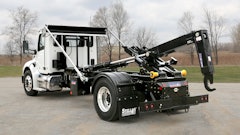As the 2012 political campaigns begin to hit full stride this summer, we're going to be hearing the same two messages over and over again: the wealthy aren't paying their fair share vs. too much government intrusion into our lives and businesses. I thought it would be fun to take a look at these two campaign catch phrases and see how they might apply to the Green Industry.
Regarding the much-maligned 1% (those making more than $350,000 a year), I'm going to go out on a limb and speculate that very few landscape company owners fall into this category. Thus, many of you shouldn't have to worry about any occupiers pitching tents on your front lawns. However, highly profitable landscape companies making more than 15-20% should consider how they are reinvesting some of their earnings back into their communities. Most companies I've come across do an honorable job in the way of charitable giving, community projects, etc.
Highly profitable companies should also consider how they are "sharing the wealth" with their employees. I'm not saying you should pay every crewmember $20 an hour with full benefits, as that could prove to be a tall order. But I do find it ironic that some of the companies that are upset over proposed H-2B wage rule changes are the same companies helping to drive down pricing.
The topic of H-2B is a good segue into a discussion on government intrusion. A Florida judge recently blocked the implementation of the Department of Labor's H-2B rule changes. That is a positive development because the judge said DOL overstepped its bounds. Expect to hear more about this developing story later this fall.
As you'll read in our online exclusive, "Irrigation Industry Needs Widespread Commitment," the EPA has backed away from its absurd "40% turfgrass restriction" for new homes. That's another good development as it shows how a regulatory agency is sometimes willing to listen to stakeholders and take their concerns into consideration before issuing a detrimental decree.
Then there's the issue of fertilizer and pesticide restrictions. It's expected that more will continue to pop up across the country in coming years. But in early May, the town of Needham, MA, voted against a ban on pesticide use. Proponents of the proposed ban said, "If you can eliminate carcinogens from daily life, why not do it?" Opponents of the ban replied, "Because an Integrated Pest Management system works very well, and could be considered mostly 'organic' anyway."
In other words, pest management professionals and lawn care operators are taking the necessary steps—on their own—to become better environmental stewards. At the same time, they are running successful, profitable businesses while giving consumers what they want. Now that makes too much sense.





















